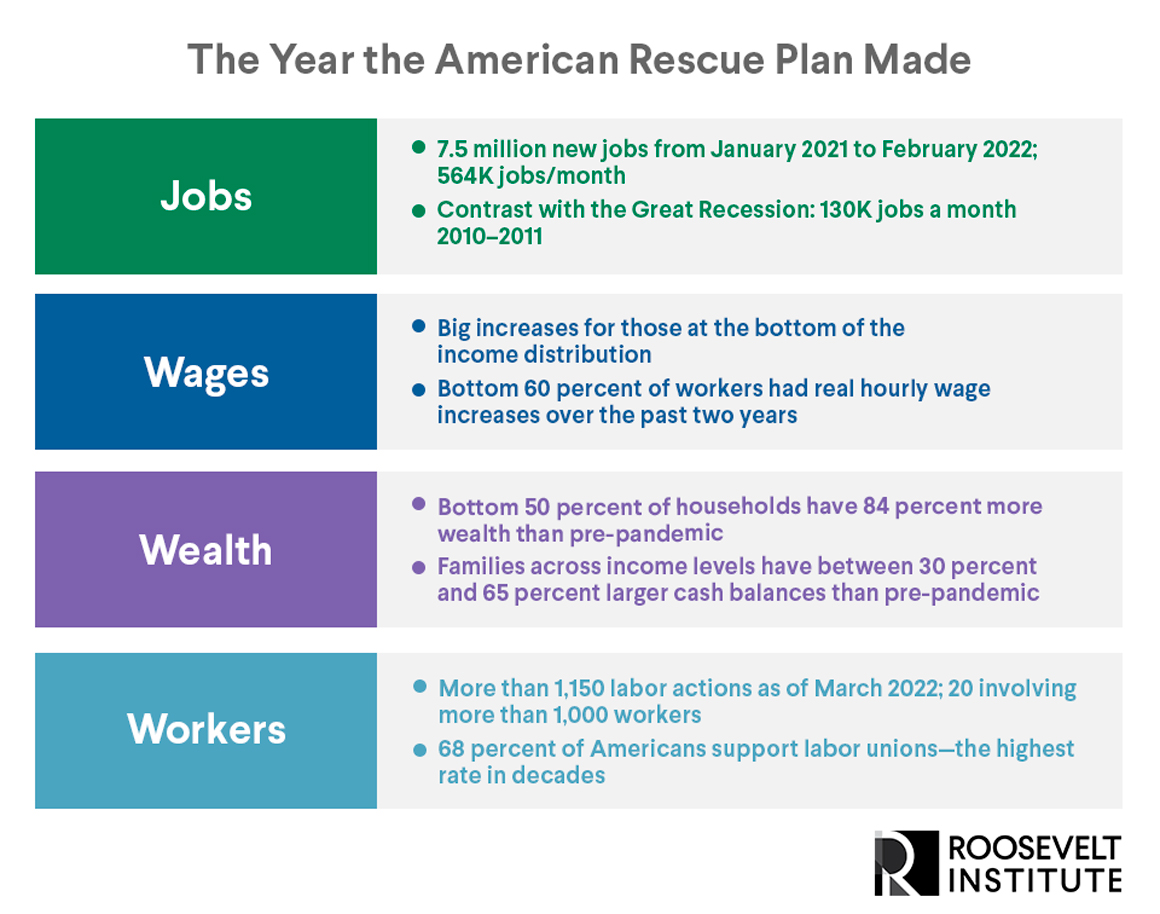The American Rescue Plan: An Economic Success Story Worth Telling
March 11, 2022
By Steph Sterling
This week marks the one-year anniversary of passage of the American Rescue Plan Act. As my colleagues Mike Konczal and Emily DiVito have argued, the choice to make full employment a serious policy goal is a political and policy success story––from jobs to wages, and wealth to worker power—that is worth celebrating. Yes, inflation is serious—yesterday’s Consumer Price Index (CPI) numbers confirm that. But the inflation we are seeing does not indicate that our economy is overheating: It demands policy actions that address root causes in the specific sectors where we are seeing those bumps, and calls for more public investment.
The macroeconomic effects and real impact of a recovery package as sprawling and ambitious as the American Rescue Plan can sometimes get lost in anniversary celebrations that elevate policy details and highlight the law’s many provisions. But losing the forest for the trees would be a political and policy mistake. The most important story—the one that Americans should hear, and progressive policymakers should tell—is that, as a result of our policy choices, our economic system has created millions of jobs, raised wages for those too often left behind, created real economic security for millions of Americans, and increased the power of workers to secure a better deal for themselves and their families.

The economic gains made during a period of upheaval and uncertainty is an important story to tell on its own, and an even better one when we compare it to the alternative: that, but for passage of the American Rescue Plan, we would still be experiencing a weaker, slower recovery and deep, lasting harm to those who have historically been left behind by past recoveries.
Telling this story will require more than just taking credit for economic gains. As Felicia Wong, Mike Konzcal, and I argued in August 2021, because the shifts we are seeing are happening against the backdrop of a decades-long effort to entrench a set of beliefs about what the economy is and how it works, the economic successes Democrats have created will require them to tell a new story about the economy in order for it to create any real political benefit.
Though there are signs of openings, most American voters—especially those who formed their understanding of the economy under the neoliberalism of the last 40 years—need leaders they trust to connect the dots between the wage gains and increased power they are experiencing at work and the policy choices the government has made. Without this story, people often default to assumptions that the state of the economy is naturally determined by the free market and that there is little government can do about it.
That’s just what we are seeing today, with people experiencing price increases as a systemic problem, but—because there has not been a consistent, sustained effort to connect the dots between the American Rescue Plan and wage gains —people experience wage increases in individual, rather than systemic, terms.
Celebrating the economic gains created as a result of the American Rescue Plan is not to minimize the real challenges we face. We have not yet reached full employment for Black workers; we have yet to rebuild the productive capacity of the economy or use all the tools of government in ways that drive down inflation; and the barriers facing women in the workforce remain as steep as they have been in decades.
But after decades of weakening labor bargaining power and eroding labor standards, as Emily DiVito and Aaron Sojourner recently argued, better jobs and increased worker power are set to drive a more equitable pandemic recovery and prosperity in the years ahead. To state it plainly, there was no invisible hand driving these gains. The American Rescue Plan created the conditions that made the wage gains, job gains, and worker voice that we see possible today. This sea change is due to the policy choices Democrats have made this year, rejecting the failed approach of the past. It is a story worth celebrating, and one worth selling.